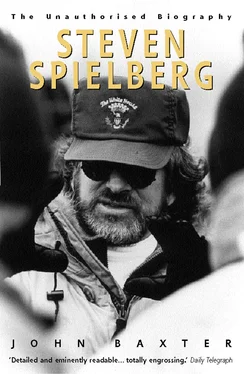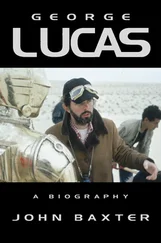His mastery of cinema technology, what critic Pauline Kael called ‘a film sense’, is innate and effortless, his innocent flair and enjoyment disguising the complexities of what he does. ‘I got the feeling,’ said Julian Glover, who acted for him in Indiana Jones and the Last Crusade , ‘that, if he wanted to, he could have built the set. He knew as much about lighting as [director of photography] Douglas Slocombe. And he operated the camera himself.’ The worst sin for a Spielberg collaborator is to fail in technique. When that happens, Spielberg can be scathing. ‘There is no, “Nice try, guys – better luck next time,”’ complained one crew member. ‘He says things like, “You didn’t get it right. Think about that when you go to bed.”’
Partly by chance but increasingly by design, Spielberg has immured himself in the prison of his facility. It is the central irony of his life that the more he is driven to employ his skills, the more they destroy the very spontaneity he strives to capture. The audience which follows him, and which he helped create, is perfectly happy, however, with technique. To them, not understanding his systematic methods, his ability to engineer entertainment machines like Jurassic Park can seem almost miraculous, and it’s to a god that many of them compare him. Or an alien. When American Premiere magazine entitled one article about E.T. and its maker ‘Steven Spielberg in his Adventures on Earth’, they articulated a sense shared by many that he does not belong here. With his rodigies of imagination undermined by physical fragility and social clumsiness, he recalled the soft-spoken extra-terrestrial played by Michael Rennie in Robert Wise’s The Day the Earth Stood Still , or David Bowie’s Martian, fragile as a stick insect, in Nicolas Roeg’s 1976 film The Man Who Fell to Earth .
Spielberg makes a credible alien. He’s most comfortable with those who live in private worlds. When stories of eccentric habits and lifestyle accreted around Michael Jackson, Spielberg, who planned to film Peter Pan with the singer and spent hours playing games with him at his Disneyland-like estate, remarked wistfully, ‘It’s a nice place Michael comes from. I wish we could all spend some time in his world.’
Spielberg’s need for protection and distance has its roots in a genuine fragility. Since he was four years old, he’s bitten his fingernails. Despite his technical ease, he was for most of his early adulthood a white-knuckle flier who had nosebleeds at high altitudes. For many years he so disliked elevators that he’d walk up half a dozen flights of stairs rather than enter one. The man who terrified the world with Jaws also hated and feared the ocean, and the director of that archetypal night-time film Close Encounters of the Third Kind admits, ‘I’m scared of the dark except in a motion picture theatre.’
It is only in the welcoming darkness of the cinema that Spielberg truly feels at home – and only with the myths of the movies that he is intellectually comfortable. Increasingly, it has been through and by myths that he has chosen to define himself. Admirers have been quick to add their own manufactured myths that confirm his role as an Honorary Outsider, and just another misunderstood teenager, like them; a Peter Pan of movies, the Boy Who Wouldn’t Grow Up, but who invested hugely in preserving himself in artificial adolescence. As early as Jaws in 1974, rumour claimed – erroneously – that Spielberg’s jeans with their multitude of zipped pockets were specially made for him at $250 a pair. Even his pet Cavalier King Charles spaniels were pressed into the fantasy. Some people felt the turnover in dogs was curiously high. As Zalman succeeded Elmer, Chauncey succeeded Zalman and Halloween followed Chauncey, rumours grew that Elmer/Zalman/Chauncey/Halloween wasn’t a dog but a role: when the incumbent lost its puppy cuteness, another replaced it. Friends insist this is untrue. However, Spielberg’s reclusiveness fanned the story, and others like it.
Although Spielberg’s career is entwined with that of George Lucas, the two men are cultural and psychological opposites. Lucas, short, slight, seems habitually curled in on himself, arms often folded across his body. Spielberg, at five feet eight inches and 151 pounds, is fractionally taller, but contrasting body language exaggerates the difference. ‘Some people look at the ground when they walk,’ he says. ‘Others look straight ahead. I always look upward, at the sky.’
Lucas’s expressionless face and low, toneless voice emphasise the mask effect of his beard and moustache. Director John Badham calls him ‘a painfully shy person who hates dealing with people’. Writer Willard Huyck, another student friend, said, ‘George made a few friends at [the University of Southern California Film School], and decided that’s about all he needed for the rest of his life.’
As a director, he communicates even less. ‘George Lucas,’ confided a Star Wars actor, ‘is the worst director in the world. Never takes his nose out of the newspaper.’ The conventional view of film as a collaborative art – or an art of any kind, for that matter – isn’t his.
Lucas’s childhood in Modesto, California, was suffused with Methodism and German Lutheranism. He reacted against it in adulthood by creating a laid-back, feel-good home life. This ‘redwood tub mentality’ amused Spielberg, who joked about ‘LucasLand’. Spielberg himself is a product of the east coast suburbs, the rural midwest and the high desert of Arizona, but culturally he is archetypally Jewish; Thomas Keneally, author of Schindler’s List , talks of his ‘classic Central European map-of-Poland face’. His first memory is of being taken to a synagogue at six months, and he learned numbers from those tattooed on the arm of a relative who survived Auschwitz. Though he’d been bar mitzvahed, he didn’t practise his religion until well into adulthood. Long before that, however, he went out of his way to introduce a Jewish dimension into his films. In both Jaws and Close Encounters of the Third Kind , characters written as gentile were redesigned to accommodate Richard Dreyfuss, an actor proudly and obviously Jewish. It wasn’t until Spielberg’s second marriage, to the actress Kate Capshaw, that he integrated his cultural heritage into any system of belief, but since childhood, Judaism exercised a powerful influence of which even he wasn’t fully aware.
Being born Jewish also gave Spielberg an entrée to Hollywood which gentiles – and this included most of the USC group – could never possess. Along with Lucas, the film-makers who came to be known as New Hollywood included Brian De Palma ( Carrie , Sisters ), John Milius ( Big Wednesday ), the slightly older Francis Coppola (the Godfather trilogy, Apocalypse Now ), husband and wife producers Michael and Julia Phillips ( The Sting ) and a group of lesser talents like writers Hal Barwood, Matthew Robbins, Willard Huyck and Gloria Katz, composer Basil Poledouris and cameraman/director Carroll Ballard.
Most emerged from that sixties phenomenon, the university film school, and elected to work inside the studio system rather than in the underground. Christened ‘Movie Brats’ by Michael Pye and Lynda Myles in their 1979 book The Movie Brats: How the Film Generation Took Over Hollywood , they rushed into the vacuum created when the US Justice Department forced the studios to shed their theatre chains and embrace the free market.
Old Hollywood had served the post-war baby boomers, now entering their thirties and looking for a Nice Night’s Entertainment. New Hollywood targeted their children, the teens and pre-teens in Nike and Adidas trainers, stone-washed Levis and New York Yankees caps, who spent homework time reading EC Comics’ Tales from the Crypt or watching reruns of the TV series Twilight Zone , and queued every weekend outside multiplex cinemas across the country.
Читать дальше












